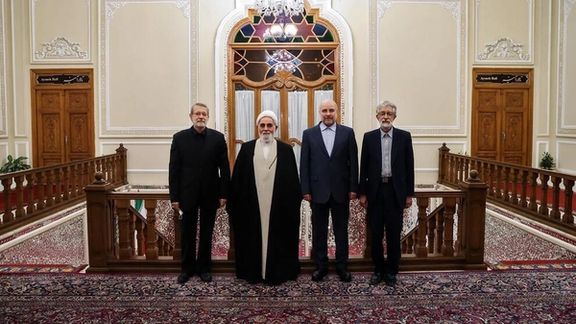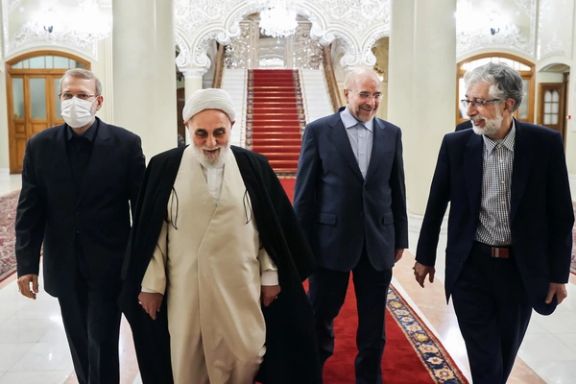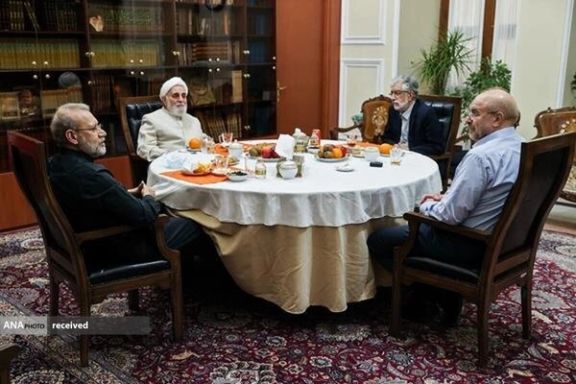Pundits In Iran See Top Conservatives Preparing For 2024 Vote

A meeting between four conservative heavyweights in Tehran has led to speculations about possible dealings ahead of the next parliamentary elections in March 2024.

A meeting between four conservative heavyweights in Tehran has led to speculations about possible dealings ahead of the next parliamentary elections in March 2024.
The meeting which was a nocturnal fast-breaking party during the last week of Ramadan, was attended by the incumbent speaker of the Iranian parliament (Majles) Mohammad Bagher Ghalibaf, who calls himself a neo-con, and his predecessors, Ali Larijani, a moderate conservative politician, ultraconservative Gholam Ali Haddad Adel, whose political stances are aligned with the Paydari Party, and Ali Akbar Nateq-Nouri, another moderate conservative who was once very close to Supreme Leader Ali Khamenei and served as his chief inspector for several years until 2017.
The meeting was called for by Ghalibaf and was held in his office and is generally believed to have been about the outlook of the parliamentary elections and the challenges facing Iran's conservatives. Interestingly, all four men were presidential candidates in different years.
Some Iranian media including the moderate conservative Khabar Online suspect that the meeting was aimed at coming to some sort of arrangement between various conservative groups, in the absence of other political groups including the reformists who have been barred from taking part in elections in Iran at least since 2020.

From among the four, Ali Larijani was the only one who told reporters that the meeting did not have any political agenda. Others remained silent.
The IRGC-linked newspaper Javan opined that the speculations about the meeting are the outcome of Iranian reformists' conspiracies. According to Javan, one of the leaders of the reformists has advised his likeminded politicians that "When your political rivals are moving toward some sort of accord, try to magnify their points of differences. Then, without any intervention just sit there and watch them fight and whenever there is a truce, you try to flare up the dispute.”
In the current round of the Majles, Ghalibaf has managed to garner support for his speakership from among the members of Paydari and the Conservatives Coalition Council, a group directly under the supervision of Haddad Adel who also has some influence in Paydari.
Haddad Adel on the other hand, who has helped Ghalibaf to win his role in the Majles, had pushed Ghalibaf aside in the 2017 Presidential election to pave the way for Raisi's victory, but Raisi lost that election to Hassan Rouhani. Nonetheless, the outcome of Haddad Adel's manoeuvres was creating the hegemony of hardliners in all three branches of the government.
The result for the country was the weakening of the Majles, which lost its supervisory power by being committed to support the hardliner government under any circumstances. Ghalibaf's attempts to stop impeachment motions to change cabinet ministers dramatically reduced the motivation of younger politicians to run for a Majles that no longer has a part in running the affairs of the state, Khabar Online wrote.

Political observers’ take on the issue is that if the next Majles, like the current one, fails to remain independent of the government, this will eventually turn the voters away from any election.
Khabar Online even opined that although there is some sort of tactical alliance between Ghalibaf and Haddad Adel, both relatives of Khamenei, they are unlikely to garner support from Larijani and Nateq-Nouri.
To further undermine the significance of the meeting of the four former presidential candidates, Lawmaker Jalal Mahmoudzadeh told reporters sarcastically that some of those in Raisi's cabinet were also presidential candidates, and you see how they are running the country and what does the country's economy look like under their management.